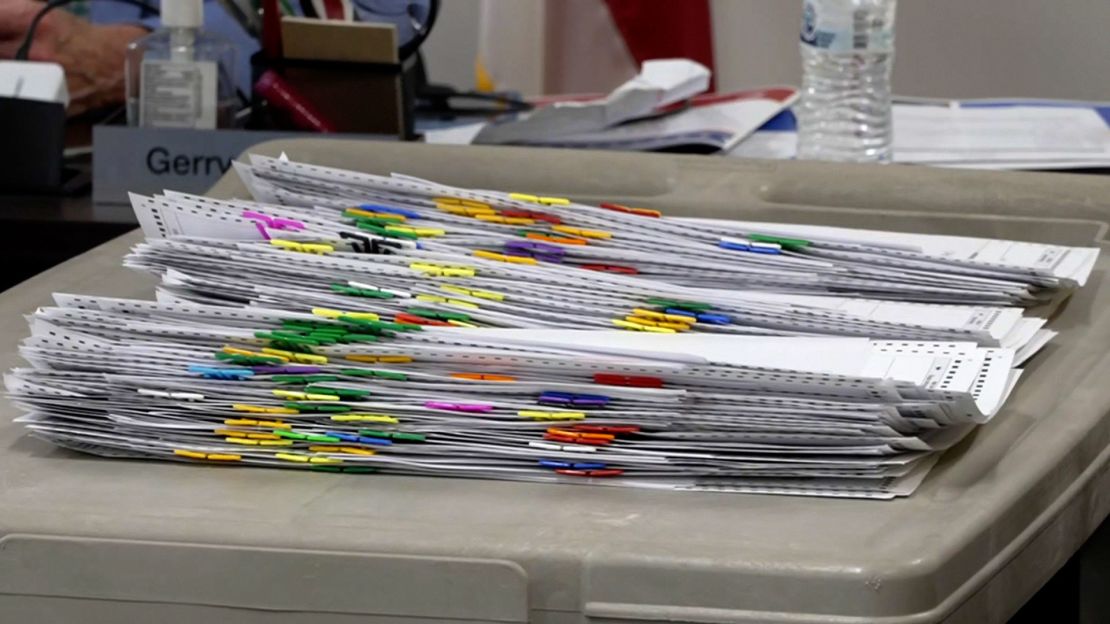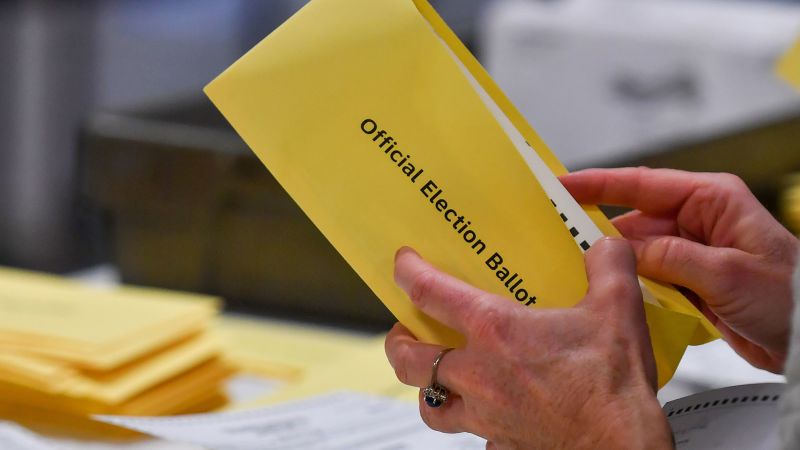After mail-in and absentee voting reached new levels in the 2020 election during the Covid-19 pandemic, a wave of lawsuits over the popular vote-casting methods this year is laying the groundwork for potential challenges to the outcome of the November presidential election.
Key swing states like North Carolina, Pennsylvania, Nevada and Michigan are still experiencing a high volume of mail-in and absentee voting. That has prompted multiple lawsuits in battleground states where Republicans are suing to challenge everything from whether mail-in ballot envelopes are properly sealed to whether they are postmarked correctly.
Democrats, for their part, have embraced mail-in and absentee balloting, and are waging their own legal fights to ensure these votes are counted. Democrats championed access to this type of voting in 2020 to ease concerns of citizens who felt unsafe going to polling sites in-person during the pandemic, and it’s still a major focus of their get-out-the-vote efforts.
Republicans, on the other hand, have been more skeptical. Former President Donald Trump has given mixed signals on the campaign trail. After his 2020 loss, he has railed against mail-in voting, saying this summer it “isn’t working, it’s corrupt.” But he also emphasizes that every vote matters, including early voting and absentee ballots.
“We need each and every one of you to make a plan to vote early and vote absentee. Do whatever you want,” Trump said at a rally last month in Erie, Pennsylvania.
With absentee and mail-in voting already underway in several states, and the race between Trump and Vice President Kamala Harris as close as ever, the outcome of litigation over these ballots could help decide the election.
“We’re at a stage now where voting is already occurring,” Paul Cox, general counsel for the North Carolina State Board of Elections, told CNN in an interview. “We are mindful that in close elections, there’s always going to be the temptation or the interest of one party or another to challenge the results.”
In North Carolina, state and national Republican Party affiliates sued the North Carolina State Board of Elections in September in an attempt to invalidate absentee ballots that are not properly sealed in their envelopes.
Starting on October 1, North Carolina counties began qualifying their absentee ballots. Every Tuesday, county election officials convene to process absentee ballots. The meetings are open to the public.
In Wake County, North Carolina, the county Board of Elections is a bipartisan group of five members: two Democrats, two Republicans and one chair appointed by the governor. The board members take turns carefully examining each ballot to make sure it is signed and dated properly, the envelope is sealed correctly, and to search for any other flaw that may disqualify the ballot.
“Sometimes there’s missing witness information, or missing notary information, or the voter didn’t sign. So, these are things that we catch,” board member Greg Flynn said after their first meeting for this election.
In the 2020 election, absentee voting appeared to favor Joe Biden in North Carolina, as more than 260,000 more Democrats requested absentee ballots compared to Republicans, though he did not win the state. There is currently no clear frontrunner between Harris and Trump in the key state.
Cox noted that in North Carolina, state law allows election workers to begin preparing for Election Day early. That enables them to start the vote counting early on “so we don’t have everything crushing in at the very last moment.”
In Pennsylvania, where the presidential race also is tight and could be contested, there are several ongoing lawsuits regarding mail-in ballots and absentee ballots.
The Republican National Committee and Republican Party of Pennsylvania filed a lawsuit to the state’s Supreme Court, seeking to end the mail-in ballot “notice-and-cure” procedures. These allow voters in some counties to fix issues found on their ballot, such as a wrong date or missing signature on the envelope, so that they can still be counted.
In a separate case, Democrats sued to strike down a state law that disqualifies a mail-in ballot if the envelope is missing the date or has the incorrect date listed.
The Pennsylvania Supreme Court declined to hear both cases over the weekend. But the RNC could bring cases after the election dealing with similar issues.
Some state officials are trying to address any problems before a ballot is cast. In Pennsylvania, officials have created educational videos for voters about the mail-in and absentee ballot process with step-by-step instructions to ensure fewer ballots get disqualified.
In Nevada, an appeal before the 9th US Circuit Court of Appeals that was brought by the RNC is challenging Nevada’s Secretary of State Cisco Aguilar over postmarked receipts on mail-in ballots. Nevada state law allows ballots to be counted if they are received up to four business days past Election Day.
The RNC argues that Nevada law is detrimental to Republican candidates because, Republicans contend, Democratic candidates are more likely to prevail with mail-in ballots counted after Election Day.

Michigan Secretary of State Jocelyn Benson is also facing a lawsuit from the RNC, alleging the state has not given complete guidance on how absentee ballots should be verified, particularly when it comes to verifying voter signatures.
“Despite this clear statutory framework, it appears that local clerks may not be complying with the requirement to mark absent voter ballot envelopes with a statement that the voter’s signature has been verified,” the complaint said.
In a separate case, Republicans challenged guidance from Benson saying that mail ballots that aren’t matched with their corresponding envelope should be noted as “challenged,” with options for curing, instead of “rejected” outright. Benson’s office says this has been the guidance in the state since 1996 and has been issued by Republican and Democratic officials.
A judge recently ordered Benson to update the guidance to make it clear that election workers “must” – not “should” – verify that the number on the ballot matches the number on the envelope.
Regardless of the RNC filing legal challenges in Michigan to disqualify absentee ballots, the Chairman of the Michigan Republican Party, Pete Hoekstra, on Monday posted a photo of him voting via an absentee ballot on X.
CNN’s Marshall Cohen contributed to this report.
Read the full article here













